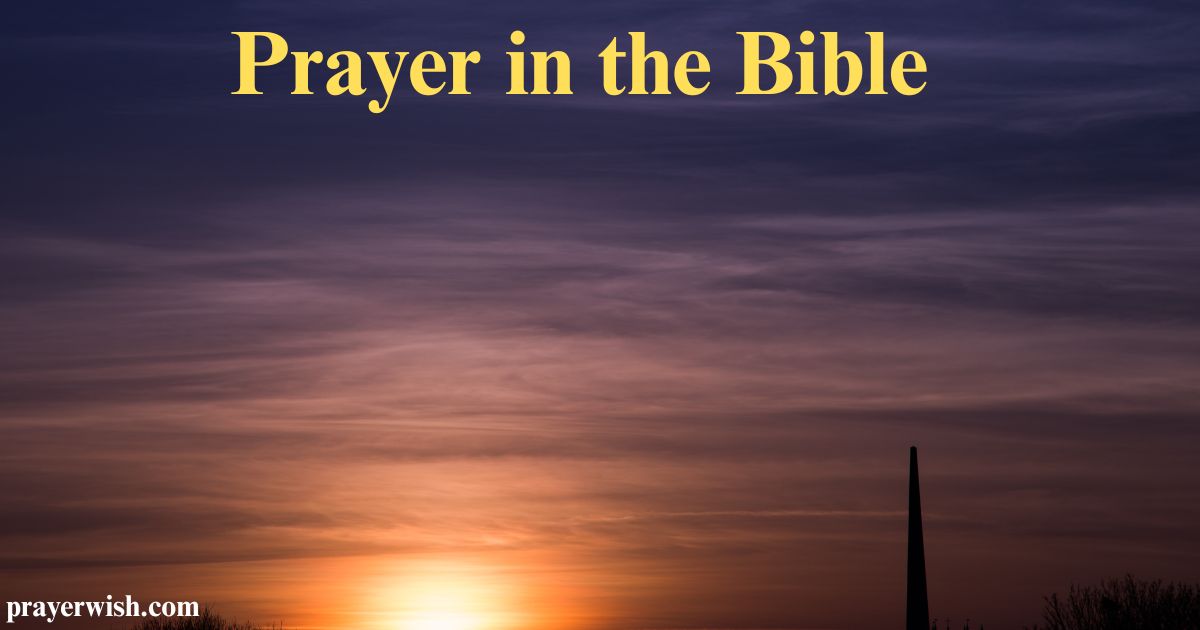Prayer in the Bible holds a special place in the life of every believer. It is more than just talking to God; it is a powerful way to connect with Him, seek guidance, and express faith. Throughout Scripture, Bible verses about prayer show us how important it is to maintain a strong relationship with God through regular communication.
Whether it’s intercession prayer for others or a personal prayer for strength, the Bible teaches us how to pray effectively and with purpose. Understanding Christian prayer habits helps us grow spiritually and discover the true power of prayer that changes hearts and lives. Prayer in the Bible is truly a gift to treasure.
What Is Prayer According to the Bible?
In the Bible, prayer is talking to God with reverence and honesty. It’s not a ritual or a magic formula. It’s real, raw, and relational. Adam and Eve walked and talked with God. Later, Moses spoke with God “as a man speaks with his friend” (Exodus 33:11). This shows us that prayer in the Bible is deeply personal. It’s how people opened their hearts to God—with joy, fear, doubt, and hope.
What does the Bible say about prayer? It says prayer should be constant, humble, and filled with faith. Jesus Himself prayed often, showing us the importance of staying close to the Father. He didn’t just pray during hard times. He prayed in the morning, in solitude, and even while surrounded by crowds. That shows us how to pray like Jesus taught. Prayer isn’t a backup plan. It’s the main plan.
Why Should We Pray? (With Biblical Passages)

Why is prayer important in Christianity? Because it aligns our hearts with God’s will. It helps us grow spiritually, and it invites God’s power into our lives. The Bible commands us to pray without ceasing (1 Thessalonians 5:17) and to bring everything to God in prayer (Philippians 4:6). That’s how we find peace and strength, even when life gets hard. Prayer in difficult times brings hope when all else fails.
When you pray, you aren’t just saying words. You’re stepping into the presence of the King. Through prayer, we ask for wisdom, strength, and comfort. We offer thanks and praise. We seek forgiveness. These are Christian prayer habits that transform lives. From David’s cries in Psalms to Jesus’ prayers in Gethsemane, the Bible shows how prayer shapes hearts, nations, and history.
How Many Times Is Prayer Mentioned in the Bible?
Prayer is mentioned over 650 times in various forms across the Bible. Words like “pray,” “prayer,” “supplication,” and “intercession” appear throughout both the Old and New Testaments. That shows how central prayer is to the Christian life. Prayer in the New Testament becomes even more focused with Jesus and the apostles constantly turning to God through prayer.
The book of Psalms contains the most prayers, filled with emotional cries for help, thanksgiving, and worship. In the New Testament, Acts shows the early church constantly in prayer. Paul also mentions prayer frequently in his letters, urging believers to pray for one another. This shows us how often we should I pray according to the Bible? The answer is—as often as possible, without ceasing.
When Is Prayer First Mentioned in the Bible?

Prayer is first mentioned in Genesis 4:26: “At that time people began to call on the name of the Lord.” This short verse tells us a big truth. People started reaching out to God as soon as they realized their need for Him. That was the beginning of a relationship between humans and their Creator through prayer. It wasn’t just ritual—it was heartfelt calling out to God.
This moment comes after the fall of man, when sin had entered the world. Even then, God made a way for connection through prayer. It reminds us that even in our brokenness, God wants to hear from us. This early moment introduces the idea of persistent prayer, which remains powerful throughout Scripture. From the start, prayer was God’s invitation to speak and be heard.
Types of Prayer Found in Scripture
The Bible reveals many types of prayer that believers use to connect with God. There’s a prayer for mercy, like the tax collector in Luke 18:13 who simply said, “God, have mercy on me, a sinner.” There’s intercessory prayer, where people pray on behalf of others. Moses, for example, interceded for Israel many times. There’s also a prayer for strength, like Jesus in the Garden of Gethsemane. He prayed so earnestly, He sweated blood.
Then there’s prayer and worship, found in the Psalms, where David pours out his soul in praise and thanksgiving. There are prayers for guidance, like when Solomon asked God for wisdom. The Bible also shows prayer and forgiveness, especially in the Lord’s Prayer: “Forgive us our debts, as we forgive our debtors.” Each of these prayers reflects a different need and a different kind of conversation with God.
Postures and Ways of Praying in the Bible

People in the Bible prayed in all kinds of ways. Some knelt, like Daniel. Others stood, lifted their hands, or bowed low to the ground. Some even lay flat on their faces in total surrender. These physical postures show respect, humility, and passion. Prayer and humility go hand-in-hand. Posture may vary, but the heart is what matters most.
Some prayers were loud and public, like Solomon’s at the temple. Others were silent and personal, like Hannah’s prayer for a child. You can pray alone or in a group. You can pray out loud, whisper, or even just think your prayers. The Bible shows us that there’s no single “right” way. It’s more about honesty than formality.
Bible Verses About Prayer
Here is a list of Bible verses about prayer, including short commentary for each:
| Verse | Reference | Meaning |
| Pray without ceasing | 1 Thessalonians 5:17 | Keep an open heart to God all the time. |
| Call me and I will answer you | Jeremiah 33:3 | God invites us to pray and promises to respond. |
| The prayer of a righteous person is powerful and effective | James 5:16 | Shows the power of prayer when paired with faith. |
| Your Father knows what you need before you ask him | Matthew 6:8 | God understands your heart even before you speak. |
| This, then, is how you should pray | Matthew 6:9-13 | Jesus gives the Lord’s Prayer meaning here. |
These scriptures teach us how to pray effectively, how to stay faithful in prayer, and how to trust God even when answers seem delayed. They also show how to develop a prayer life grounded in truth.
How to Hear God’s Voice Through Prayer

One of the most comforting parts of prayer is that God answers. But how to hear God’s voice through prayer? It often happens in quiet ways. Through His Word, through peace in your heart, through the Holy Spirit nudging you in a certain direction. Sometimes He speaks through people or events. Other times, through dreams or thoughts you can’t explain.
How does the Holy Spirit help in prayer?
Romans 8:26 says the Spirit helps us when we don’t know what to pray. He prays for us with deep groanings that words can’t express. That means even in silence or confusion, the Spirit connects us to the Father. Prayer isn’t about perfect words. It’s about being real with God.
God’s Redemptive Plan Through Prayer
From Genesis to Revelation, we see God working through prayer to bring about His redemptive plan. Abraham pleaded for Sodom. Elijah called fire from heaven. Jesus prayed for His disciples. In every case, God listened. Can prayer change outcomes? Yes, it can. But more often, it changes us—our hearts, our attitude, our perspective.
Prayer connects us to God’s purposes. Through intercessory prayer, we lift others before God. Through prayer and God’s will, we surrender our desires and trust His plan. Sometimes answers come fast. Other times they take years. But every prayer brings us closer to God’s heart and His story of redemption.
Final Thoughts: Living a Life of Prayer
Prayer isn’t something you master. It’s something you live. A life of prayer is built day by day, moment by moment. How to keep praying continuously? Make it part of your rhythm. Pray in the morning, before meals, during stress, in joy, at night. Talk to God like He’s right there—because He is.
Even when you feel distant, don’t stop. How to pray when feeling distant from God? Just be honest. Tell him how you feel. Ask for help. The more you open your heart, the more you’ll see His love. In the end, prayer brings peace, strength, and deep joy. So keep praying—in every season, with every breath.
FAQs
What is the powerful verse for prayer?
Philippians 4:6 says, “Do not be anxious about anything, but in every situation, by prayer and petition, with thanksgiving, present your requests to God.
What are the 4 types of prayer?
The four main types are praise, confession, thanksgiving, and supplication (asking for needs).
Which scripture talks about praying always?
1 Thessalonians 5:17 instructs believers to “pray without ceasing.
What scriptures are used when praying?
Common scriptures include the Lord’s Prayer (Matthew 6:9-13), Psalms, and Philippians 4:6.
How did Jesus define prayer?
Jesus taught prayer as a sincere, humble conversation with God, emphasizing faith, forgiveness, and persistence (Luke 11:1-13).
Conclusion
Prayer in the Bible is powerful, intimate, and transformative. It’s not just about asking for things—it’s about relationship, trust, and worship. From Genesis to Revelation, God invites us into conversation with Him. Whether it’s a prayer for strength, a prayer for guidance, or a whisper in a storm, He hears every word.
As you grow in faith, remember the many types of Prayer in the Bible—intercession prayer, prayer and forgiveness, prayer in difficult times, and more. Let the Lord’s Prayer’s meaning shape how you speak to God. Trust in the Holy Spirit’s help in prayer, and don’t be afraid to bring your full self before Him. Keep praying, keep listening, and keep walking closely with the One who loves you most.

Prayer Wish is a place where heartfelt words meet divine purpose. It offers powerful, faith-filled prayers for love, healing, and spiritual growth.

